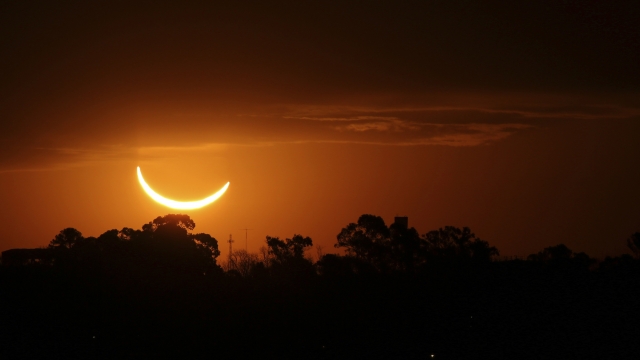The moon's shadow sweeps across parts of the U.S., Mexico and Canada on April 8, marking a total eclipse in those regions, and while it's a cosmic wonder, it's also a fascinating opportunity for animal behavior researchers. It's only in recent years that scientists have started to rigorously study the altered behaviors of wild, domestic and zoo animals during a full solar eclipse.
Less than two weeks from now researchers will look for signs of bewilderment in birds, anxiety in apes and confusion in canines.
"To our astonishment, most of the animals did surprising things," said Adam Hartstone-Rose, a North Carolina State University researcher who led the observations published in the journal Animals.
Questions abound: When a total solar eclipse transforms day into night, will tortoises start acting romantic? Will giraffes gallop? Will apes sing odd notes?
Seven years ago, Galapagos tortoises at the Riverbanks Zoo in Columbia, South Carolina, "that generally do absolutely nothing all day, during the peak of the eclipse, they all started breeding," said Hartstone-Rose.
The cause of the behavior is still unclear.
Researchers will be standing by to observe how animals' routines at the Fort Worth Zoo in Texas are disrupted when skies dim on April 8.
A mated pair of siamangs, gibbons or monkeys that usually call to each other in the morning, sang unusual tunes during the previous afternoon eclipse. A few male giraffes began to gallop in "apparent anxiety." The flamingos huddled around their juveniles.
Researchers say that many animals display behaviors connected with an early dusk.
In April, Hartstone-Rose's team plans to study similar species in Texas to see if the behaviors they witnessed before in South Carolina point to larger patterns.
Several other zoos along the path are also inviting visitors to help track animals, including zoos in Little Rock, Arkansas; Toledo, Ohio; and Indianapolis.
This year's full solar eclipse in North America crisscrosses a different route than in 2017 and occurs in a different season, giving researchers and citizen scientists opportunities to observe new habits.
As for indoor pets, they may react as much to what their owners are doing — whether they're excited or nonchalant about the eclipse — as to any changes in the sky, said University of Arkansas animal researcher Raffaela Lesch.
"Dogs and cats pay a lot of attention to us, in addition to their internal clocks," she said.
SEE MORE: This map shows the best time to see the solar eclipse in your city
Trending stories at Scrippsnews.com




